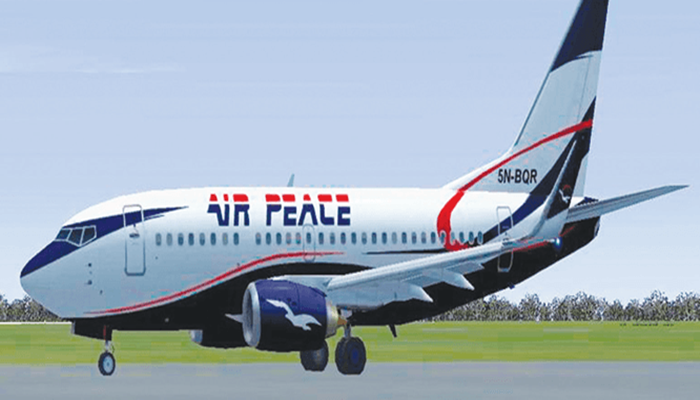Air Peace partners Boeing, Cranfield University to drive safety excellence in aviation

Air Peace, Nigeria’s premier airline and West Africa’s largest carrier, collaborated with The Boeing Company, a leading global aerospace company in the US, and Cranfield University, a specialist postgraduate university in the UK with world-class expertise, large-scale facilities and unrivalled industry partnerships that creates leaders in technology and management globally, to fortify safety culture and operational excellence at Air Peace Limited.
Working under the aegis of Boeing Global Learning Institute (BGLI), and themed: Advanced Leadership in Safety Excellence, the leading global aerospace company brought together all the executives, postholders and management leadership of the various departments of the airline in a five-day in-person classroom training, aimed at improving their safety leadership skills, transform the workplaces’ safety culture, gain practical tools to implement the new knowledge, thus fostering a culture of continuous improvement within the organization.
The partnership between Air Peace and Boeing is borne out of a shared commitment to shaping the future of aviation leadership. Over the years, Air Peace has recognized that a deep, unwavering commitment to safety is key to its continued success. The programme aimed to build upon that vision, enabling executives to lead with confidence, manage risks effectively, and create high-performing teams that prioritize safety at every level.
According to Harry Magui, Senior Organisational Consultant and Programme Manager, Boeing Global Learning Institute, “the Boeing company has long recognised the importance of supporting continuous learning of our aviation partners. To that end, the Boeing Global Learning Institute designs and delivers numerous learning programmes to both emerging and established leaders of our partners. These efforts aim to develop leadership, business, and technical skills so that our partners can improve their business processes, increase operational efficiency and enable leaders to strengthen their teams to ultimately grow their business.’
Alluding to the great work Air Peace has done in making safety a pre-condition rather than just priority, Magui said: “We’re here to partner with our great partner, Air Peace who have been phenomenal in advancing the Aviation Industry in Nigeria, so we are here to support them to harness more opportunities in the future with the Advanced Leadership in Safety Excellence Training for all its top leadership within the organization.”
For Prof Graham Braithwaite, Head of Aerospace, Cranfield University, “This collaboration ensured that the training directly address the challenges Air Peace faces, culminating in real-world capstone projects that would have a lasting impact.”
Reinforcing Prof. Braithwaite’s position, Dr. Fabian Steinmann, Lecturer, Organisational Resilience and Change, Cranfield School of Management, who was excited at the great progress Air Peace made over the years said that they are happy to learn and share knowledge and find ways to strengthen the system, making it robust and flexible to adapt to the ever-changing environment.
“Safety is at the heart of everything we do at Cranfield so the privilege we have is that we travelled around the world, picked up the good practices, learned more about the culture and the operation in various countries so we’re here to facilitate that exchange with Nigeria and Air Peace to see how we share some of the good practices and lessons learned from all around the world and translate them into their operation.”
The programme’s curriculum was carefully crafted to blend theoretical insights with hands-on practical applications. In the first phase, discussions led by Prof. Braithwaite and Dr. Steinmann set the stage by aligning Air Peace leadership’s operational insights with the program’s objectives.
Phase two provided participants with direct access to experts from Cranfield University and Boeing, equipping them with advanced tools and strategies for safety leadership. Beyond the classroom, participants were empowered to implement their learnings within their teams, creating a ripple effect that would strengthen safety systems across the organization.
“This class is quite essential and we’re lucky to have our resource persons impact knowledge on us. It is a well-structured training and especially for Air Peace because of where we are now and where we hope to go in the future. The whole essence of this class is to reinforce what we know before and be exposed to other avenues of learning. The aviation industry is ever-changing and dynamic, and Air Peace has to be abreast of such developments,” says Captain Godfrey Ogbogu, Safety Manager at Air Peace.
He noted that Air Peace’s commitment to safety and operational excellence has never been more evident, adding that the partnership has not only cultivated a deeper understanding of safety leadership but also laid the groundwork for a more resilient, accountable, and innovative workforce, poised to tackle the evolving challenges of the aviation industry.
The programme emphasized accountability through two follow-up review sessions, ensuring that participants continued to develop their leadership skills and advance their safety projects. This dual focus on personal leadership growth and organizational impact ensured that safety remained at the forefront of Air Peace’s operational strategy.






